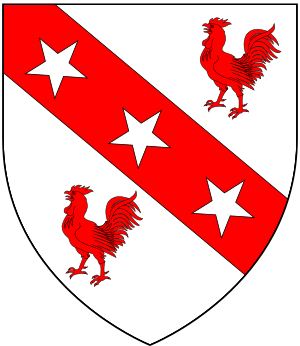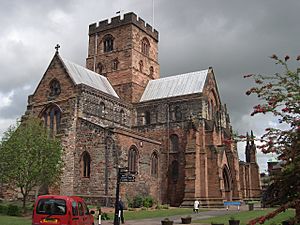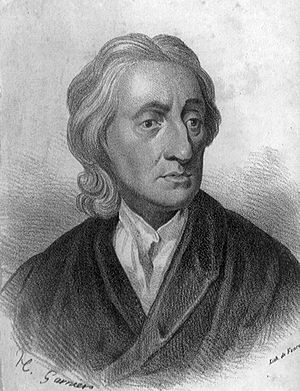Edmund Law facts for kids
Quick facts for kids Edmund Law |
|
|---|---|
| Bishop of Carlisle | |
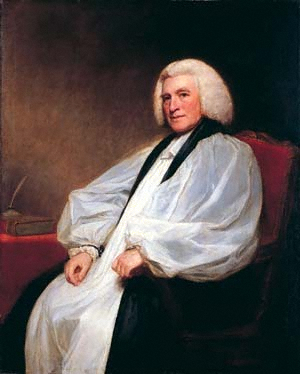
Edmund Law, by George Romney, 1781
|
|
| Church | Church of England |
| See | Carlisle |
| In Office | 1768–1787 |
| Predecessor | Charles Lyttelton |
| Successor | John Douglas |
| Personal details | |
| Born | 6 June 1703 Cartmel, Lancashire, England |
| Died | 14 August 1787 (aged 84) Dalston, Cumberland, England |
Edmund Law (born June 6, 1703 – died August 14, 1787) was an important leader in the Church of England. He held several key positions, including being the Master of Peterhouse, Cambridge, a professor at the University of Cambridge, and the bishop of Carlisle. He was known for his calm nature and his belief in freedom of thought within religion.
Contents
The Early Life of Edmund Law
Edmund Law was born in a small village called Cartmel in Lancashire, England, on June 6, 1703. His father, also named Edmund Law, was a local church leader and a school teacher. Young Edmund went to school in Cartmel and then to a grammar school in Kendal.
He later attended St. John's College, Cambridge, where he earned his first degree in 1723. He became a fellow (a kind of academic staff member) at Christ's College and continued his studies. Edmund was a very dedicated student.
Climbing the Church Ladder
In 1737, Edmund Law became the priest of Greystoke in Cumberland. Around this time, he married Mary Christian, who came from a family with royal connections.
He quickly rose through the ranks in the church. In 1743, he became the Archdeacon of Carlisle, which is a senior church official. He then moved to a new church in Great Salkeld.
In 1754, Law became the Master of Peterhouse, one of the colleges at Cambridge University. He also held other important roles at the university, such as the university librarian in 1760. In 1764, he became the Knightbridge Professor of Moral Philosophy, teaching about ethics and how people should live. He also held several other church positions, including in Lichfield Cathedral and Durham Cathedral.
Becoming Bishop of Carlisle
In 1768, Edmund Law was chosen to be the bishop of Carlisle. A bishop is a high-ranking leader in the Christian church, overseeing a large area called a diocese. His friend and biographer, William Paley, said that Law saw this promotion as proof that open discussion and new ideas were still welcome in the church.
His Final Years and Family
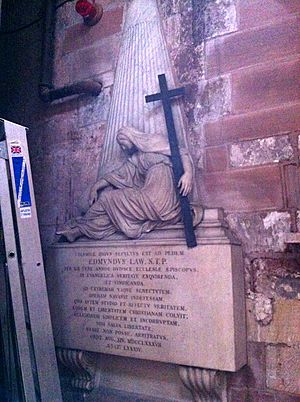
Edmund Law passed away on August 14, 1787, at the age of 84, at Rose Castle in Dalston, Cumbria. He was buried in Carlisle Cathedral. His monument there says he believed that "simple and pure religion cannot exist without freedom." People who knew him described him as a very gentle and calm person.
His wife, Mary, died before him in 1772. They had many children, including eight sons and four daughters. Some of his children also became famous:
- John Law (1745–1810) became a bishop.
- Ewan Law (1747–1829) became a Member of Parliament.
- Edward Law, 1st Baron Ellenborough (1750–1818) became a very important judge, the Lord Chief Justice.
- Thomas Law (1756–1834) became a successful investor in Washington, D.C., USA.
- George Henry Law (1761–1845) also became a bishop.
Edmund Law's Writings and Ideas
Edmund Law was a well-known writer and thinker. One of his first works was a translation of a book called Essay on the Origin of Evil in 1731. He added many of his own notes to it.
His most famous book, Considerations on the State of the World with regard to the Theory of Religion, was published in 1745. In this book, he suggested that humans are always learning and improving their understanding of religion, just as they do with other types of knowledge.
Law was a big follower of the philosopher John Locke, who believed in reason and individual rights. Law also strongly believed in religious toleration, meaning people should be free to believe what they choose.
In 1774, he wrote a pamphlet (a short book) arguing that church leaders should not have to promise to believe in every single church teaching forever. He thought it was enough for them to agree to follow the church's services and traditions.
He also edited the collected works of John Locke in 1777, which included his own essay defending Locke's ideas about personal identity. Bishop Law also published several sermons.
See also
- List of bishops of Carlisle
 | Frances Mary Albrier |
 | Whitney Young |
 | Muhammad Ali |


